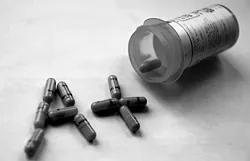Besides alcohol and marijuana, a category of pharmaceuticals garnering considerable attention among college students on campuses nationwide is a class of drugs known as psychostimulants.
Drugs like Adderall and Ritalin, medications used to treat attention deficit hyper-activity disorder, a condition marked by an inability to pay attention, have become attractive to a wide swath of the student population. Psychostimulants are very different than other drugs abused by college students as users often don’t seek them out for a high. Adderall, in particular, is especially attractive because students think of it as an effective, cheap study aid.
“[ADHD medication] heightens your ability to pay attention to things which normally bore a person and allows you to focus for a longer amount of time,” says Adam Plotnik, a clinical psychologist based in Farmington Hills. “For someone who has ADHD or ADD, it really allows them to function like people who don’t have ADHD or ADD.”
In college, we hear many success stories with these drugs. But one question many non-ADHD students are asking is: Will this medication work for me? The answer is that it will, but with some side effects.
“I think there’s a myth out there that if you are a hyperactive or ADHD kid, Ritalin or Ritalin-like medications are going to work on you differently than they will on the normal population,” psychiatrist Harold Koplewicz said in an interview with the Internet forum Big Think. “For all of us, whenever we would take one of these medicines… you will be more focused, you will be more attentive, you also might be a little more uptight or hypervigilant.”
It might seem like Koplewicz implicitly endorses illicit drug use, but, like the other psychiatrists and psychologists, his role is to explain, not to justify. Koplewicz adds, “If you don’t have ADHD and you’re going to take [Ritalin], [or] any psychostimulant, any type of drug like this is going to increase your heartrate, it may elevate your blood pressure, it will decrease your appetite. Those things are side effects that are unnecessary if your dopamine and norepinephrine levels are normal.”
A good doctor will do a cost-benefit analysis weighing adverse effects against desired ones for patients, and will then prescribe them a calculated dosage. It follows then that there is significant danger for illicit users of ADHD medication. Without knowing their dosage, illicit users have a greater risk for overdose, and thus a greater chance of experiencing adverse side effects.
Yet, non-ADHD students continue to use and abuse these pharmaceuticals. John Taylor, a psychologist and coordinator of psychological testing and consultation services at Michigan State University’s Counseling Center, reported that MSU students were overwhelming campus medical doctors with requests for ADHD evaluations — most of which were non-ADHD drug seekers, Taylor suspected. At the doctors’ request, MSU opened a separate assessment center, where Taylor currently works.
Taylor considered the huge number of requests for ADHD evaluations, as well as the larger phenomenon of non-ADHD students seeking ADHD medication, and began to question their motivation.
“ADHD medications have become a silver bullet,” Taylor says of the sudents’ motivation for seeking psychostimulants. “Students are looking for something that will boost their mental powers, that will give them a competitive edge. Part of it is where society is at right now. It’s very competitive.”
Although he aims to explain the use rather than justify it, he says he sympathizes with modern college students’ tough conditions. “College students are really under the gun these days,” he says, citing national economic problems that will particularly affect college-age students, such as student loans and associated debts.
And college students agree. The University of Michigan’s student newspaper, The Michigan Daily, published an article headlined “Study Strong: how students on campus misuse stimulants,” which said today’s college students live in an “increasingly competitive college environment, where [they] are being pushed to achieve socially, academically and professionally.”
But students may also be giving psychostimulants too much credit. Given the currency of stories about students taking ADHD drugs and then studying for an organic chemistry exam for entire days, or writing an A-plus paper in only three hours, it’s important to debunk a few misconceptions about what ADHD medication does.
Koplewicz points out that when people with ADHD use these drugs, “They are able to do what they’re capable of doing. It doesn’t increase your IQ points, it doesn’t make you smarter, it lets you get to the IQ points that you do have.”
But, as with any new phenomenon, the questions multiply. Is the use of ADHD similar to baseball players taking steroids? Is taking a performance-enhancing drug cheating? For now, these are personal questions. All these psychiatrists and psychologists can do is give recommendations. It is we who must ask ourselves: When is “good” good enough?
Zak Witus is entering his sophomore year at the University of Michigan and was an editorial intern at Metro Times this summer. Send comments to letters@metrotimes.


